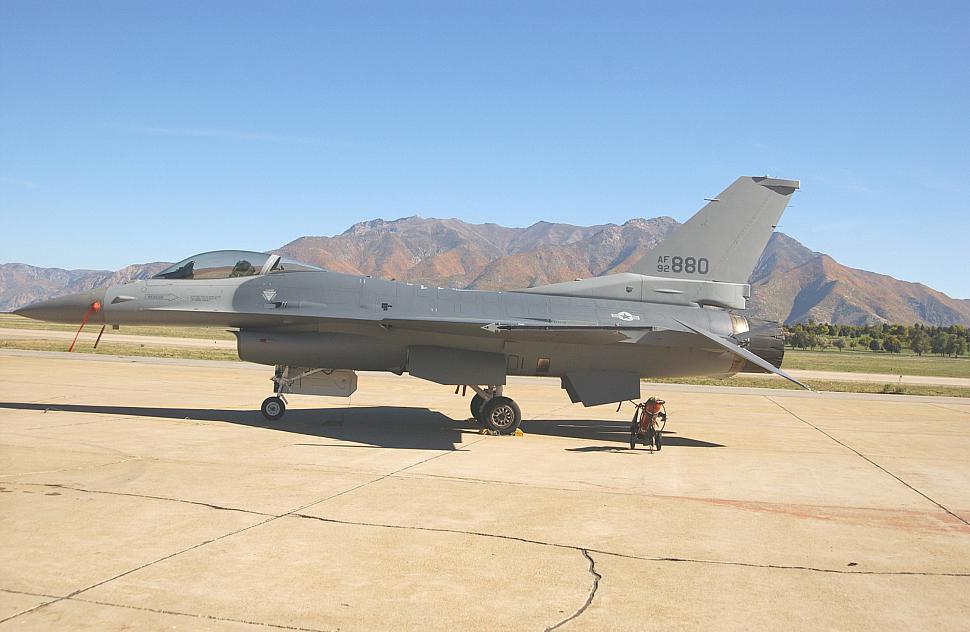Fighter Jet News
F-16 Fighting Falcon News
First F-16 CCIP delivered
January 28, 2002 (by
Lieven Dewitte) -
Close cooperation between Lockheed Martin and the U.S. Air Force enabled the Ogden Air Logistics Center (ALC) to complete modification of the first U.S. Air Force aircraft in the F-16 Common Configuration Implementation Program (CCIP) ahead of schedule.
Ogden ALC is the primary depot for the worldwide F-16 fleet. The aircraft, a block 50 F-16C, was ferried to Shaw Air Force Base, S.C., on Jan. 11, and arrived there in Code One condition (no flight discrepancies). The 20th Fighter Wing at Shaw is the first unit to receive the F-16 CCIP aircraft.
"The transition from kit proofing to ramping up the depot modification line has gone very smoothly, and we are actually beating our planned schedule," said Norm Bates, Block 50 program manager at Ogden. "I credit this to the close teamwork between the F-16 SPO, the Ogden depot and Lockheed Martin Aeronautics."
"Delivery of the first CCIP aircraft from the modification line is an important milestone in the program," said William J. Lake, director of USAF F-16 Programs. "It won?t be long before these aircraft begin operational service, and we expect great acceptance by the pilots and maintainers alike."
The F-16 CCIP, valued at over $1 billion, will significantly enhance the cockpit and avionics of about 650 Block 40/50 F-16s in the USAF inventory. The modification will provide hardware and software commonality to the USAF Block 40/50 fleet, thus improving logistics support and reducing costs of future upgrades. In addition, the modification provides a high degree of commonality with F-16A/Bs being upgraded by five European NATO countries and with advanced Block 50/52 versions currently being developed for several other countries.
CCIP development began in June 1998. Lockheed Martin Aeronautics Company, the prime contractor for CCIP, delivered the first production retrofit kits two months early, in June 2001. Currently, 15 F-16s are undergoing the CCIP mod at Ogden, and 31 kits have been delivered.
Recently, the USAF issued a $85 million contract modification authorizing the Fiscal Year 2002 CCIP kit buys. The first of these kits will be delivered late this year.
CCIP modification of aircraft is being implemented in phases. The first phase involves only new core computers and color cockpit modifications to some Block 50/52 aircraft. In September 2002, Block 50/52 aircraft will begin receiving the advanced interrogator/transponder and will be able to employ the Lockheed Martin Sniper XR advanced FLIR targeting pod.
The next phase, starting in July 2003, adds the NATO-standard Link 16 data link, the Joint Helmet-Mounted Cueing System and an electronic horizontal situation indictor. The Block 50/52 aircraft receiving the modifications in the earlier phases will go back through the depot mod line at Ogden to receive the additional changes. The Block 40/42 versions will receive the entire modification all at one time, beginning in 2005.
"The transition from kit proofing to ramping up the depot modification line has gone very smoothly, and we are actually beating our planned schedule," said Norm Bates, Block 50 program manager at Ogden. "I credit this to the close teamwork between the F-16 SPO, the Ogden depot and Lockheed Martin Aeronautics."
"Delivery of the first CCIP aircraft from the modification line is an important milestone in the program," said William J. Lake, director of USAF F-16 Programs. "It won?t be long before these aircraft begin operational service, and we expect great acceptance by the pilots and maintainers alike."
The F-16 CCIP, valued at over $1 billion, will significantly enhance the cockpit and avionics of about 650 Block 40/50 F-16s in the USAF inventory. The modification will provide hardware and software commonality to the USAF Block 40/50 fleet, thus improving logistics support and reducing costs of future upgrades. In addition, the modification provides a high degree of commonality with F-16A/Bs being upgraded by five European NATO countries and with advanced Block 50/52 versions currently being developed for several other countries.
CCIP development began in June 1998. Lockheed Martin Aeronautics Company, the prime contractor for CCIP, delivered the first production retrofit kits two months early, in June 2001. Currently, 15 F-16s are undergoing the CCIP mod at Ogden, and 31 kits have been delivered.
Recently, the USAF issued a $85 million contract modification authorizing the Fiscal Year 2002 CCIP kit buys. The first of these kits will be delivered late this year.
CCIP modification of aircraft is being implemented in phases. The first phase involves only new core computers and color cockpit modifications to some Block 50/52 aircraft. In September 2002, Block 50/52 aircraft will begin receiving the advanced interrogator/transponder and will be able to employ the Lockheed Martin Sniper XR advanced FLIR targeting pod.
The next phase, starting in July 2003, adds the NATO-standard Link 16 data link, the Joint Helmet-Mounted Cueing System and an electronic horizontal situation indictor. The Block 50/52 aircraft receiving the modifications in the earlier phases will go back through the depot mod line at Ogden to receive the additional changes. The Block 40/42 versions will receive the entire modification all at one time, beginning in 2005.
Related articles:
Tags
- Lockheed Martin to start production phase of major F-16 avionics upgrade (1999-09-07)
- F-16 Fighting Falcon news archive
Tags

